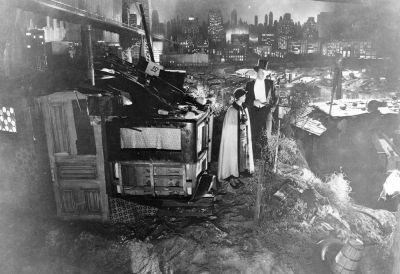
MAN'S CASTLE
(Vicino alle stelle, USA/1933) R.: Frank Borzage. D.: 75'. V. inglese
Frank Borzage, il nobile e romantico mistico del cinema americano, seppe spesso cogliere l'essenza dei temi più dolorosi del suo tempo, dalla Guerra mondiale, all'ascesa del nazismo e alla Depressione, quest'ultima mai descritta in modo così commovente come in Man's Castle, un altro connubio tra poesia e dolore. Ancora una volta prevalgono i paradossi e le immagini inverosimili, a partire dal modo in cui Borzage illumina una vicenda che si svolge nel famigerato luogo-simbolo della Grande Depressione, la bidonville che prese il nome da un presidente incapace: Hooverville. Il ghetto del Lumpenproletariat è reale nel senso che la sua miseria è mortalmente presente. Nello stesso tempo la narrazione è un sogno fiero e romantico: è Hollywood in tutta la sua pienezza, con le vicende eteree della fede umana, le piccole vittorie, il prevalere degli uomini sulla tragica realtà materiale. Il tutto si svolge con seducente candore, senza facili compromessi. Sono le persone a contare: la loro presenza, il loro aspetto fiducioso, il modo in cui si toccano a vicenda. Le ultime immagini del film - sul treno - sono le più trionfanti del cinema romantico: niente al mondo è impossibile, nulla è improbabile, specialmente se i cittadini sono come Spencer Tracy e Loretta Young, la coppia più memorabile di Borzage (naturalmente insieme a Janet Gaynor e Charles Farrell, diretti da Borzage in tre film a partire da Settimo cielo).
Frank Borzage, the noble and romantic mystic of the American cinema, often went to the heart of the most poignant themes of the times he lived in - the World War, the rise of Nazism and the Depression, the last of these never so movingly as in Man's Castle - once again armed with poetry coupled with pain. As often, paradoxes and unlikely images prevail, starting with the way Borzage lights a story that takes place in the most notorious landmark of the Great Depression, named after a failing president - Hooverville. The ghetto of the homeless Lumpenproletariat is real in the sense that the trouble shown is mortally present. At the same time the narrative is like a proud, romantic dream - it's Hollywood in its plenitude, with ethereal facts of human faith, or small human victories in unofficial places, that prevail in spite of tragic material realities. This happens with winning naiveté, with no trace of cheap compromise. It's people themselves who count: their presence, their look of confidence, the way they touch each other. The last images of the film - in the train - are the most victorious in all romantic cinema: nothing in the world is impossible, nothing is improbable, especially with citizens like Spencer Tracy and Loretta Young, the greatest Borzage couple (of course, along with Janet Gaynor and Charles Farrell, who made several films together for Borzage starting with Seventh Heaven).
Tariffe:
Aria condizionata
Info: 051224605











